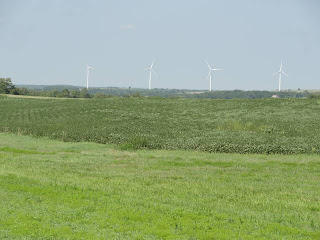There is good reason for Kansas, and its neighbors Nebraska, Iowa, Illinois, and Indiana, to be called the nation's "breadbasket." One home-made Kansas sign informs passers-by that one Kansas farmer feeds 127 people, or as the sign puts it, "126 people + you."
Fields of corn and soybean stretch along these miles of unimpeded vista, and they are just as breathtaking as the higher elevations of mountains that challenged the earlier settlers who braved the journey and lived through blistering hot summers and bitterly cold winters to transform the land into productive agriculture.

This year's corn crop will be down a little bit - Kansas, especially, has been hit by early flooding followed by miserable drought. The thermometer passed the 100 degree mark while we were there. Yet, even with the weather challenges that this year's farmers, and every year's farmers, face, we will have a phenomenal crop - thanks to the biotechnology that goes into seed production and today's agricultural practices.
Corn and soybeans are staples of the American diet. Hybrid corn finally became acceptable to farmers in the late 1950s. Soybeans are an even newer addition to American agriculture. We transform our diets as we find newer ways to produce abundant crops more economically.
In urban areas, well-fed people disparage corn-based products and the widespread use of soybean products in processed foods. In an age of plenty, it is easy to forget that 80 years ago, our national "breadbasket" experienced a horrific, long-term drought that could have easily brought our government to its knees. People are more tolerant of joblessness than they are of hunger, and it is noteworthy that our government was not overthrown during the Dust Bowl years.
Farming has always been a risky business. It is still one of the most dangerous occupations around, and the demands on farmers to use more expensive inputs and larger machinery force them to look for ways to increase yields and productivity. Much of this economic pressure comes from the government's cheap food policy - the same policy that prevented the overthrow of the government in the 1930s when food and money were scarce. Recent testimony before the Senate Ag Committee, holding field hearings in Wichita, KS, underscores the importance of a crop insurance program that reduces farmers' exposure to the very weather events that will reduce this year's corn yields.
On the East Coast, where I live, the politics of food has intensified. Discussions center around pushing for more locally-produced foods in school cafeterias, hospitals, and restaurants. Arguments abound regarding the dangers of high-fructose corn syrup over the use of cane sugar as a sweetener. Even the root causes of obesity generate heated discussions, although to me the answer to that one is fairly simple: eat less and move more.
In the meantime, Kansas farmers, and those in the neighboring states, faithfully plow and plant year after year. It is they who keep us sufficiently sated that we can argue the fine points over a meal, but maybe it's time we remember who brought the food in the first place.
No comments:
Post a Comment